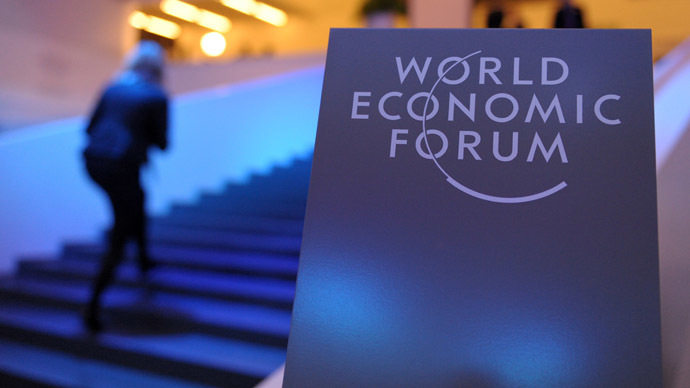Bill Gates says "the world is better than it has ever been before" at Davos Forum
World ‘great’ for billionaires at Davos, rampant inequality still threat

Participants arrive at the congress centre prior to the opening of the World Economic Forum in Davos on January 21, 2014. (AFP Photo)
On the eve of the Davos forum Bill Gates, the world’s richest man, said that “the world is better than it has ever been before,” but experts at the forum in Switzerland suggest his view from the top may be a bit foggy.
The world’s rich and powerful have congregated in the picturesque Alpine resort of Davos to discuss issues most have never had to deal with up close and personally – severe poverty and inequality.
The Gates Foundation, the world’s largest and most generous charitable foundation released their annual open letter which sought to debunk myths of poverty and inequality and predicted that by 2035 “there will be almost no poor countries left in the world”.
The World Economic Forum (WEF) which hosts the event, warned last week that the biggest danger to the global economy over the next decade is wealth inequality, as it can give rise to social instability and rampant poverty.
"I think, when you have such a disparity between the wealth controlled by such a few number of individuals, or the gap that exists between that minority verses the majority, you really do have the potential for such significant unrest in different parts of the world, which is going to be one of the biggest challenges we are going to have to deal with," Dennis Nally, Chairman and Senior Partner of PricewaterhouseCoopers LLP, told AP on the sidelines of the forum.
“The biggest danger is that this small group of people also capture political power,” Winnie Byanyima, Executive Director, Oxfam International United Kingdom said.
World leaders gather at the WEF at the beginning of each year to gauge what’s coming up next in the economic year, and the theme for the this year’s forum is “The Reshaping of the World: The Consequences for Society, Politics, and Business".
Businessmen and CEOs at the forum are optimistic about the upcoming economic year. Nally said of 1344 CEOs surveyed, 44 percent expect the global economy to improve, more than double the 18 percent figure last year.
A preview of the year to come, the gathering of the brightest minds and most successful business men is an opportunity for colossal change on a range of issues- from private sector forecasts and political monetary policy to the issues of climate change and virtual currency.
A study released last week by the host organization found that 1 percent of the world’s population owns one half of the world’s wealth.
This year’s forum in Davos has attracted more than 2,500 business and political leaders and at least 80 billionaires.
Twenty millionaires hailed from the US, home to 132 of the Fortune 500 companies according to 2013 numbers.
India is also well represented at the forum, with 19 billionaire attendees with a combined net worth of $250 billion, Bloomberg News reported.
Key events of the forum will be held January 22-26 and concludes with a black-tie ball on Saturday evening.
Haven for billionaires
At the beginning of the week Oxfam released a report that says 85 of the world’s wealthiest people have as much money as the poorest 3.5 billion - half of the Earth’s population.
“Working for a Few” focuses on economic inequality, and reports 210 people became billionaires last year, joining the existing 1,426 billionaires, who combined, have a net worth of $5.4 trillion. The rapid increasing wealth poses the biggest threat to civil society, and those with power must act responsibility.
Post financial crisis economic development has gone back into the pockets of the already mega wealthy. The World Bank expects the world economy to expand 3.2 percent in 2014, but this expansion will be polar between the haves and the have-nots.
Pope Francis sent Cardinal dispatch a special representative envoy to Switzerland to deliver a cautionary message to the over 2,500 businessmen and political leaders.
“The systems, both political and financial, are set up in a way that favor the rich in the first place,” said Byanyima.
Behind wealthy individuals are their successful companies, which need to act responsibly, she added.
“Wealthy companies need to step up their leadership and refrain from using their financial power to rig the political process, to highjack democracy,” she said.
“Capital gains are taxed much less than a regular wage that ordinary people make their incomes – this is just one example of how the rules are skewered in favor of the rich,” said Byanyima.
Tags:
"Destroying the New World Order"
THANK YOU FOR SUPPORTING THE SITE!
Latest Activity
- Top News
- ·
- Everything
ancient lost worlds ~ DNA
FEYNMAN: THE QUEST FOR TANNU TUVA (1988)
FEYNMAN: THE QUEST FOR TANNU TUVA (1988)
Terror on All Hallows Eve Pt. 2 The Aftermath
Three Must See Movies for Halloween
Terror on All Hallows Eve
© 2025 Created by truth.
Powered by
![]()
